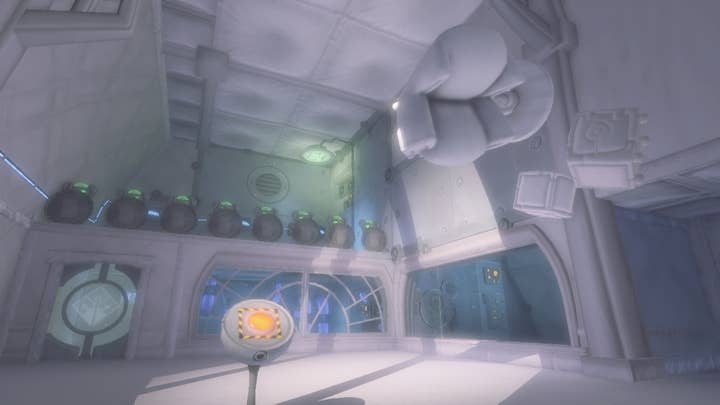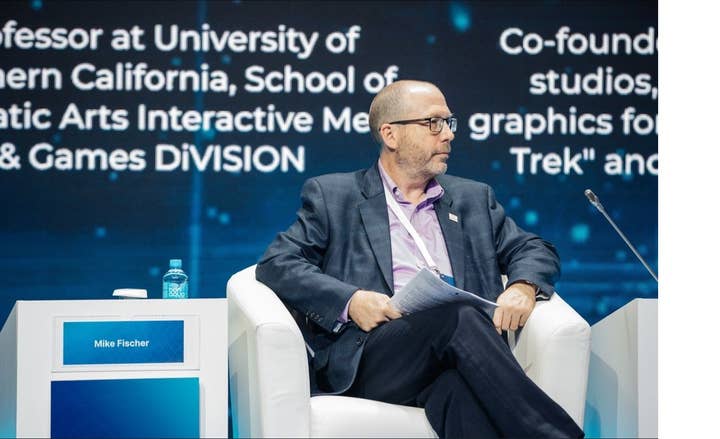Former Square Enix of America CEO reflects on betting on new IP
Mike Fischer discusses the evolving challenge of making an original property stand out in a crowded games market
Sign up for the GI Daily here to get the biggest news straight to your inbox
In a hits-driven industry such as video games, investing in new and emerging IP is often considered a financial risk. As budgets rise, so do expectations. While new games like Helldivers 2 and Palworld find fame and success, Immortals of Avenum struggled to the point where maker Ascendant Studios reportedly furloughed most of its staff.
Acquiring an existing franchise’s legacy doesn’t always work either — just look at Embracer’s restructuring efforts. Saber Interactive CEO Matthew Karch points to an "opportunity to make great entertainment at a price that isn't going to kill somebody's bank account" with Warhammer 40,000: Space Marine 2 dropping later this year.
To understand what gaming as a whole is currently experiencing, we sought out an expert who has worked on both established IP and new titles.
We sat down with Mike Fischer, the former CEO of Square Enix of America, to talk about betting on experimental IP and his pivot to working as a professor in Interactive Media at USC. While mass market appeal may be important, no genre is all-encompassing and there's still money to be made in gaming's many niches. That's where Mike's role of broadcasting sound business fundamentals comes in.
As a CEO of the American arm of one of Japan's most celebrated publishers, it didn't take long for Mike Fischer to find that "the biggest cultural differences [were] between the development culture and the publishing marketing culture." From his experience in the industry, most developers weren't business-oriented.
"[A] joke we have is that when a game is successful, it's because it's a great game," he said. "And when a game is a failure, it's because of bad marketing. What I've found is it's most important to understand what the creators' vision is for their game but also what the real market opportunity is. Find a way so that those can work together in harmony and that the game can achieve its full creative potential."
"Subscription services are a wonderful opportunity for games to be discovered that are not in decades-long franchises or multi-million dollar media campaigns"
This intersection between market opportunity and developer vision is evident in 2024's first knockout hit Palworld, reaching over 25 million players in a month. While the game plays hard and loose with its inspirations and familiar mechanics, there's no denying it was tailored for a mix of popular niches. Building something new at that scale at an established studio, especially when existing franchises are doing well, is no small ask. While Fischer and his team were keen on expanding their purview with games built in the US, they encountered friction within the company.
"Different organizations had their say in the decisions that were made about publishing these [experimental] games," noted Mike. "We did have a wonderful slate of innovative new games. We called it the Online and Mobile Group. Unfortunately, we weren't allowed to bring as many of the games to market as we would have liked."
One key example he pointed to was Quantum Conundrum from 2012, a puzzle game directed by Portal's lead designer Kim Swift that centered around a contraption that flipped you between dimensions. Reviews were largely positive among both critics (77 on Metacritic) and players (Very Positive on Steam).
"[It was] a wonderful game... but we were only able to release half the game. It was part one, not part two. I often think about what could have happened if we had been given the license to continue working on it. We were a subsidiary and we had to understand the limitations and the requirements of the larger global organization."
Today, there's a crucial new discovery avenue for emerging IP that wasn't available to Quantum Conundrum: subscription services like Game Pass or PlayStation Plus. Fischer was quick to note their importance.
"To me, these are discovery engines. It's a real challenge, how you discover new things. You used to have radio and now Spotify is the tool for discovering new music. You used to have channel surfing and now YouTube and TikTok serve as a way to find new linear entertainment. But it's hard to do that in games. Subscription services are a wonderful opportunity for games to be discovered that are not either decades-long franchises or games with multi-million dollar media campaigns."

Fischer pointed to Squanch Games' High on Life as a game that found success via subscription, becoming 2022's biggest Game Pass launch. "I discovered my favorite game, probably of all time, Rocket League, through the PlayStation subscription service. That's what I'm interested in, helping those middle-tier games. They're not super small indies that are hobby projects, but they're not AAA games that have multi-million dollar budgets."
Fischer currently serves as a professor in Interactive Media at USC, one of the top universities in America. "I teach in the entrepreneurship track at USC," he tells us. "I'm teaching these game developers the business fundamentals that they need to be successful. The key thesis that I have is that you will not achieve your full creative potential unless you really understand the business dynamics of the industry."
He noted that the tussle between art and business has been shaping the world for a long time. "Van Gogh was a wonderful artist. He sold something like two paintings in his entire life (outside commissions). Even Rembrandt at one point basically bankrupted himself by creating a painting that was so large, expensive, and creative that he spent his fortune creating it with his studio. And then his patrons didn't pay because it wasn't what they were expecting. Rembrandt and Van Gogh failed to achieve their full potential because of a lack of understanding business. What hope do we have?"
A lack of understanding business from upper management impacted some of the most talented teams in gaming this year. While gamers see a continuous stream of fantastic titles, the CEO of a public company warned that 2024 is likely to be "the year of closures." Disheartening layoffs from Microsoft and Riot join those of EA, Sony, and Eidos Montreal from the first two months of 2024 alone. While a lot of it can be attributed to mismanagement at the top, few managers hold themselves accountable for them save for mentioning it in public statements. The 'sustainable cost structure' argument falls flat when you see Microsoft's market cap break $3 trillion right when its layoffs occurred.
"Games are like pancakes. The first one you cook is never quite perfect"
"Some of the greatest games we know today, Fortnite, Rocket League, and Overwatch, really struggled. Overwatch was built out of a canceled Project Titan. Rocket League was cancelled twice. And Fortnite struggled before it adopted the battle royale. The difference I've noticed is that the teams who are just too stubborn to give up don't quit."
While new titles may struggle to find their footing, shakeups at established companies mean that the people who shouldered legacy IP are no longer making your favorite games. Expecting a gold rush of new indie studios to fill in the void, however, is wishful thinking. A leading VC recently observed to us "Why take a gamble with a games company when you can just stick the money in the bank and earn 5%?"
Mike Fischer concluded our interview with a quote from a Kazakhstan developer. It's emblematic of games as a whole, particularly ones that could shine with some more time in the oven.
"Games are like pancakes. The first one you cook is never quite perfect. Even if your first project doesn't achieve all your goals, learn from it. Start again and build on that foundation."
In an industry that rarely permits a second chance, only sweeping changes can bring a more sustainable means of developing some of art's finest labors of love. There's no denying that the pool of talent is drying up. But with multi-platform AA efforts like Helldivers 2 paying off, the tide might just be shifting towards games of smaller scope that delight their audiences.
Sign up for the GI Daily here to get the biggest news straight to your inbox






.jpg?width=291&height=164&fit=crop&quality=80&format=jpg&auto=webp)

